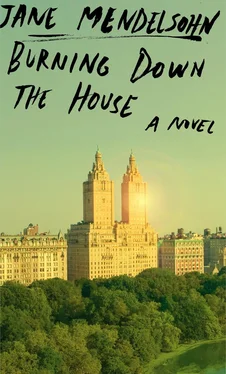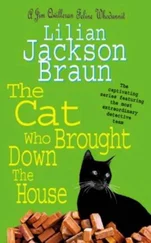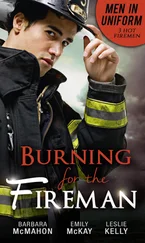—
There is a solitary attractively disheveled man in this chair and he lifts his gaze from his book to look at her. It is Ian in his wedding suit, with a drink, a book. There are three guests who wander in at the far end of the room and glance at Ian and Poppy briefly before leaving. Poppy stands at an angle facing some leather-bound volumes with her champagne flute at her lips and her bare foot slipping in and out of her high-heeled shoe. She sips and doesn’t notice him and Ian shakes a rueful head at her and closes his book and takes a swallow of his drink.
—
You’re not dancing, he says.
Poppy looks around at him from under her brim. Are you talking to me?
I thought you’d be dancing.
That stuff? On the patio? She tilts her chin toward the windows.
Yes, the band, he says.
She looks back at the bookshelves.
The real dancing is later, she says.
I see.
They’re having a DJ. Somebody big, she says to the bookshelves.
He stares at her. He gets out of the chair and walks over toward her. So you’ll be dancing for real later?
If I feel like it.
Do you think you’ll feel like it?
Why do you ask?
—
Poppy watches the shadowy glints of light and dark which play before her on the rows of books, red burning leather with gold etching. She feels the enormous effort of trying to appear as if she is not paying much attention to Ian. Still managing to act disinterested, she turns to him. His eyes are soft and gray. There is a fine engraved pattern around them, a network of very thin lines that looks like writing. If she could read that language it would explain so much. But she cannot.
—
He speaks slowly: I hear that you don’t want to apply to college. I had a blast in college but admire you for wanting to get on with life, he says.
—
There is a long but surprisingly not awkward silence between them. Neither of them can quite tell if it is erotic or dull. Ian lifts his eyebrows and continues.
—
If you’re interested, there’s plenty to do in the theater. After graduation you could be my assistant, or something like that, learn about the electric world of Broadway, he says with an expression that conveys mockery and sincerity at the same time. He lifts his hands, one holding a drink, one splayed out Bob Fosse — style. You know, “All That Jazz,” he says. Think about it. It’s not the worst way to start a career. He looks at her with the tiniest smolder, not enough to make him seem lecherous, but just enough so that she is too scared to look at him anymore.
—
But she couldn’t be his assistant because she was going to work for Steve as soon as she finished high school, she explained, and anyway she had outgrown her interest in the theater — she was over that — and she moved away along the books and books and books waving her champagne flute in Ian’s direction, and of course he accepted it without following her because she was much too young for him anyway and what else could be done?
—
But he knows then that he will be communicating with her soon. On the dance floor, during their separate return travels to New York, and back in the city as he crosses paths with her because of his close association with Alix. He knows now as he watches her walk away that somehow she will come to him. He thinks this is an intuition of fate, or a form of hope, but it isn’t. It is simply a decision on his part that he is going to get what he wants and do whatever he can, however stealthily, to make this to-him-at-the-moment-minor-dream come true. He is his own gullible mark and a con artist at the same time. This doesn’t make him an evil person. He is not one kind of person; like all of us, he has many aspects. But his narcissism is a part of him that he has not yet had to examine or tackle or renounce and so in his personal life he is very often destructive. He is not, at least, as destructive as some people. He knows that, takes some remote comfort in it.
—
Poppy is self-destructive. The last thing she attempts to do is to hurt deeply anyone other than herself. As she walks away Ian sees her, for an instant, in all her fierce, stunningly pretty, self-destructive glory. He sees her and for a brief flickering moment comprehends her in a way that he does not comprehend himself.
—
On the dance floor he keeps his eyes on her even when they are not dancing together. She gets dipped by one of Miranda’s dashing financier friends. Poppy’s short hair practically touching the floor, her bare legs long and angled and stuck to the ground in her pointy-toed silver sling-backed shoes. Her face rapturous, shining, like a very good, very old diamond so clear and colorless that it looks like nothing but is everything, contains and refracts every color. He keeps his eyes on her.
—
The way these parties end: in intoxication and mistakes and sex and sometimes blood. They drank on and on and ate and danced under another tent and the fireworks fell all over themselves and the wind violated everybody’s hair and people walked off into the shadows with one another and couples argued and things were said that could never be unsaid and as the dawn was bleeding faintly over the proceedings Jonathan was kneeling above Miranda in bed and she whispered something to him but he didn’t say anything back. He was in his own element, something like fire but not as pure, one of those chemical fires that glows blue and green and orange. Afterward, he lay on his side, burnt wood. The next day by lunchtime most of the guests were gone. The tents came down. Men with headsets removed the party. Ian woke up late and missed the farewell brunch. He stood on the front steps of the house overlooking the wide pale gravel driveway scattered with the remaining revelers just in time to watch the bride and groom drive off in an Aston Martin. It was beginning to drizzle again. There was a silvery sky behind the tall trees.
Watch out, he muttered under his breath to the newlyweds. You might get what you’re after.
He had been holding a cup of coffee and now he took a sip from it and turned around and headed back up the green-carpeted staircase to pack his bag.
IN LONDON tall men stood in attendance at the hotel entrance and regarded the new arrivals dispassionately. Steve, Patrizia, Neva, the twins, Ian, Alix, and Poppy swept past like some well-appointed band of itinerant jugglers or magicians, circus performers impersonating aristocrats. An understatedly luxurious scarf of ostrich feathers trailed behind Poppy, a plume of smoke from her neck.
—
Spending a few days in London after the wedding before returning to New York, the family had settled into a routine of meeting for dinner and spending their days separately, the twins taken to parks or attractions by Neva, or Patrizia when she wasn’t consuming, Ian and Alix off to neighborhoods and galleries, Poppy left mostly on her own to wander. Steve worked in his London office or at the hotel.
At dinner Ian asked Poppy, How do you like London?
I love it, of course, but I’m a bit lonely this time.
I’d have to say the same.
They both watched Alix covertly as she sat at the far end of the table, her eyes piercing the menu, her expression puzzled, angry, hopeful, and irritated all at once. Poppy unfurled her napkin.
She’s deeply depressed, said Poppy.
Who?
You know who. The saintly nun. Sister Alix.
Ian looked down the long table at Alix’s judging, critical squint.
How did you two become such enemies?
Whatever do you mean? My biggest worry is that something will happen to her. I pray to God every day that she doesn’t injure herself, said Poppy drily, ripping a piece of bread.
No really, how did it happen?
Читать дальше












